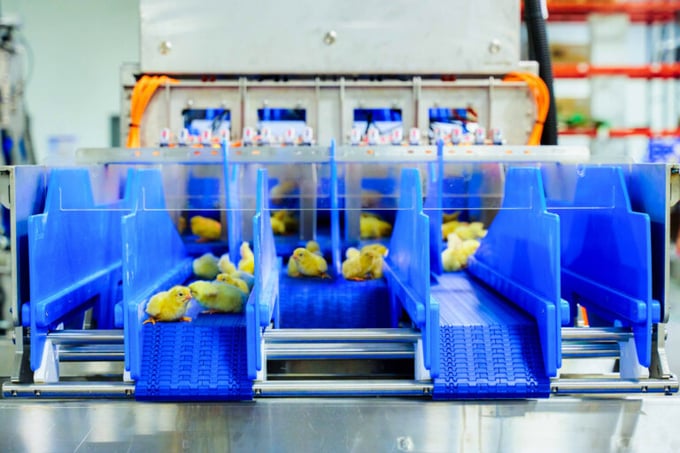November 10, 2025 | 18:32 GMT +7
November 10, 2025 | 18:32 GMT +7
Hotline: 0913.378.918
November 10, 2025 | 18:32 GMT +7
Hotline: 0913.378.918
Consumer demand for consistent, high-quality broiler meat is only predicted to grow over the coming months, yet the pressure to improve operational efficiencies across the value chain intensifies.

Photo: Targan.
Industry experts anticipate rising US broiler meat prices in 2025, driven by potential labour challenges linked to new immigration policies by the incoming Trump administration, the persistent threat of avian influenza, and other factors impacting the global poultry trade. Companies of all sizes are seeking solutions that streamline operations, reduce risks, and support sustainable growth in an increasingly volatile market.
Innovative solutions are essential to modern broiler production, with technologies like automated egg handling at the hatchery, precision feeding systems on the farm, and automated deboning lines at the processing plant widely adopted. Now, the industry is entering a new era, driven by the latest breakthrough: automated feather sexing. This new technology isn’t just automating an existing process, it’s changing how poultry companies grow their birds entirely, to extract more value per bird.
In 2024, industry leaders started to adopt these sexing systems to stay ahead of the curve. The benefits have become evident, including enhanced welfare, improved flock uniformity, and higher yields, creating a more predictable and efficient supply chain.
Targan’s WingScan system, powered by artificial intelligence (AI), represents a significant leap forward. This advanced imaging solution accurately separates male and female broiler chicks based on their wing feather patterns, streamlining the sexing process with remarkable speed and accuracy. WingScan can identify up to 160,000 chicks per hour, depending on the system configuration, with an accuracy of up to 98%.
Sex-separate rearing, enabled by automated feather sexing, delivers significant advantages across the production chain. For companies new to sexing, the benefits are evident: improved farm management and enhanced efficiency at the processing plant.
On the farm, separating male and female birds allows producers to implement tailored, sex-specific strategies such as optimised feeding programmes and precise environmental controls. These practices improve flock health, enhance performance, and enable more birds to consistently reach their target weights.
At the plant, consistent bird sizes unlock further benefits. Automated systems operate more effectively, reducing damage to high-value cuts and increasing overall yield. By optimising key processes like chilling, deboning, and portioning, producers can reliably meet customer requirements while maintaining high-quality standards.
Even for companies already sexing, automated systems offer a new level of efficiency and control. Automated sexing replaces manual sexing processes, which can be time-consuming and labour-intensive. Automated solutions offer a more animal-welfare-friendly and less invasive method of sexing and sorting, with increased speeds and accuracy.
One such company, Boire & Frères, reported that integrating WingScan into existing hatchery operations led to a throughput rise of more than 50% to 110,000 chicks per hour. This demonstrates the tangible impact that automated feather sexing can have on operational efficiency and overall productivity, even for companies with established sexing practices.
Producers who embrace automated feather sexing today are making a critical investment in the future. This technology has become essential for modern poultry operations, addressing the demand for efficiency, uniformity, and sustainability. It enhances profitability, reduces waste, and strengthens competitiveness in an evolving market.
As we move into 2025, automated sexing is poised to become a standard practice, reshaping how poultry operations achieve their goals. Now is the time to act – adopting this innovation as a cornerstone of production will ensure producers stay ahead in a rapidly changing industry.
(Poultryworld)

(VAN) FAO Director-General conveys message at General Plenary Leaders Dialogue at Climate Summit in Brazil.

(VAN) Much has been said about the threat to European broiler meat industry from the EU-Mercosur deal, while the potential impact on egg segment is largely neglected, said National Chamber of Poultry and Feed Producers.

(VAN) There’s an old climate joke that goes, 'You may not believe in climate change, but your insurance company does'.

(VAN) Probiotics have emerged as a promising tool in poultry production, offering a natural and effective means to enhance the health and productivity of poultry.

(VAN) Interview with Kaveh Zahedi, FAO’s Director for Climate Change, Biodiversity and Environment.

(VAN) China has begun purchasing U.S. farm products after leaders of both countries met last week, but traders await soybean purchases after the White House said Beijing pledged to buy 12 million tons by year-end.

(VAN) The State of Food and Agriculture 2025 report focuses on land degradation caused by human activities.